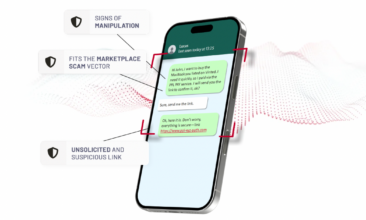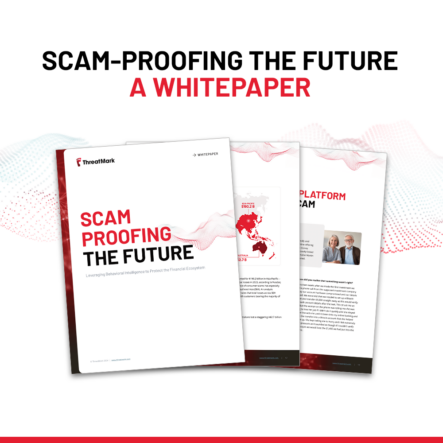Insights
Explore the latest company news, market insights, and the latest on digital fraud with our Insights.
Whitepaper
SCAM-PROOFING THE FUTURE: A WHITEPAPER
Scams are becoming more sophisticated, posing new challenges for financial institutions. Explore the whitepaper for an in-depth look at the evolving scam landscape, including real-world impacts and insights on using behavioral intelligence to detect and prevent fraud effectively.
Download Now
Filter Close
-
 June 30, 2025
Disrupting Fraud in the Balkans: A Holistic Approach for a Fragmented Region
Online fraud in the Balkans is evolving.
As digital banking accelerates and scams grow more targeted, banks in the region...
June 30, 2025
Disrupting Fraud in the Balkans: A Holistic Approach for a Fragmented Region
Online fraud in the Balkans is evolving.
As digital banking accelerates and scams grow more targeted, banks in the region...
-
 June 16, 2025
Six Months of the UK’s APP Scam Reimbursement: Lessons for Banks
It’s been six months since the UK’s new reimbursement rules came into effect.
A bold move that’s drawn attention from...
June 16, 2025
Six Months of the UK’s APP Scam Reimbursement: Lessons for Banks
It’s been six months since the UK’s new reimbursement rules came into effect.
A bold move that’s drawn attention from...
-
 June 3, 2025
New Account Fraud: Essential Strategies for Detection and Prevention
New account fraud—once seen as a niche tactic—is now a mainstream threat.
From synthetic identities to AI-powered deception, fraudsters are...
June 3, 2025
New Account Fraud: Essential Strategies for Detection and Prevention
New account fraud—once seen as a niche tactic—is now a mainstream threat.
From synthetic identities to AI-powered deception, fraudsters are...
-
 May 28, 2025
Why Smarter Collaboration Is Crucial to Fighting Scams in the Netherlands
As online scams surge across the Netherlands, most victims never recover their losses and trust in digital banking is...
May 28, 2025
Why Smarter Collaboration Is Crucial to Fighting Scams in the Netherlands
As online scams surge across the Netherlands, most victims never recover their losses and trust in digital banking is...
-
 May 19, 2025
ThreatMark Launches ScamFlag, a GenAI-Powered Solution to Combat the $486 Billion Digital Fraud Crisis
ScamFlag enables banking customers to instantly detect scams with 99% accuracy, addressing the soaring threat of Authorized Push Payment...
May 19, 2025
ThreatMark Launches ScamFlag, a GenAI-Powered Solution to Combat the $486 Billion Digital Fraud Crisis
ScamFlag enables banking customers to instantly detect scams with 99% accuracy, addressing the soaring threat of Authorized Push Payment...
-
 May 14, 2025
The Power of Partnership: ThreatMark and SymphonyAI Join Forces to Bolster Fraud Prevention
ThreatMark has partnered with SymphonyAI—a leader in predictive and generative AI SaaS solutions—to provide an advanced, unified fraud prevention...
May 14, 2025
The Power of Partnership: ThreatMark and SymphonyAI Join Forces to Bolster Fraud Prevention
ThreatMark has partnered with SymphonyAI—a leader in predictive and generative AI SaaS solutions—to provide an advanced, unified fraud prevention...
-
 April 15, 2025
The Baltics Under Pressure: RTP, Scams, and Smarter Fraud Defense
The Baltic states—Estonia, Latvia, and Lithuania—are rising players in digital banking. But this growing digital maturity comes with a...
April 15, 2025
The Baltics Under Pressure: RTP, Scams, and Smarter Fraud Defense
The Baltic states—Estonia, Latvia, and Lithuania—are rising players in digital banking. But this growing digital maturity comes with a...
-
 April 15, 2025
Account Takeover Fraud: Everything You Need to Know for Prevention
Account takeover is a fraudster’s holy grail.
John Fick, a fraud prevention expert on the Behind Enemy Lines podcast, explained...
April 15, 2025
Account Takeover Fraud: Everything You Need to Know for Prevention
Account takeover is a fraudster’s holy grail.
John Fick, a fraud prevention expert on the Behind Enemy Lines podcast, explained...
-
 March 21, 2025
Norway’s Wake-Up Call from an $80M Crypto Scam
Norwegian authorities recently charged four men in connection with an $80 million cryptocurrency fraud.
What does this case reveal...
March 21, 2025
Norway’s Wake-Up Call from an $80M Crypto Scam
Norwegian authorities recently charged four men in connection with an $80 million cryptocurrency fraud.
What does this case reveal...
-
 March 5, 2025
The APP Scam Epidemic: Behavioral Intelligence as a Game-Changer
Authorized push payment fraud (APP fraud) is taking the world by storm, leaving victims vulnerable and damaging trust in...
March 5, 2025
The APP Scam Epidemic: Behavioral Intelligence as a Game-Changer
Authorized push payment fraud (APP fraud) is taking the world by storm, leaving victims vulnerable and damaging trust in...
-
 February 19, 2025
Outsmarting Fraud Without Overspending: A Cost-Efficient Approach for Banks and Credit Unions
Balancing the demand for advanced anti-fraud technology with tight budget constraints remains a challenge for many banks and credit...
February 19, 2025
Outsmarting Fraud Without Overspending: A Cost-Efficient Approach for Banks and Credit Unions
Balancing the demand for advanced anti-fraud technology with tight budget constraints remains a challenge for many banks and credit...
-
 February 11, 2025
The Dark Side of AI: How Fraudsters Are Using Artificial Intelligence to Scam at Scale
If any topic dominates cybersecurity in 2025, it will be artificial intelligence. How is AI helping fraudsters carry out...
February 11, 2025
The Dark Side of AI: How Fraudsters Are Using Artificial Intelligence to Scam at Scale
If any topic dominates cybersecurity in 2025, it will be artificial intelligence. How is AI helping fraudsters carry out...
